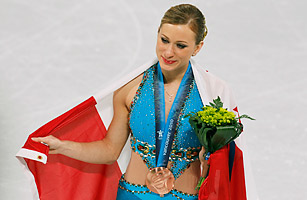
The 2010 Winter Olympics in Vancouver got off to a horrific start. Hours before the Opening Ceremonies in February, Nodar Kumaritashvili, a luger from Georgia, died after crashing during a training run, casting a pall over the Games. The lack of padding and protection on the dangerously fast Whistler sliding track had contributed to the unthinkable tragedy, and a few other glitches, though far less consequential, also embarrassed the Canadian hosts: a mechanical torch malfunctioned during the opening ceremonies, an Olympia ice-resurfacing machine broke down at the speedskating venue, causing a delay, and organizers had to helicopter in snow for the freestyle skiing and snowboarding events.
But once the media stopped fixating on what some dubbed the Glitch Games, captivating drama overtook the Olympics, as it usually does. And perhaps no moment was more poignant than when Joannie Rochette, a Canadian figure skater, finished her sterling long program to clinch a bronze medal. Two days before the start of the short program, Rochette's mother, Therese, had died of a heart attack while attending the Games. Rochette decided to compete anyway, saying "I know what it's what my mom would have wanted me to do." After skating through her visible grief in the short program, the Canadian fans gave her a rousing ovation, as if she was a daughter of their own. After the emotional competition, Rochette endearingly eulogized her mom, cracking that "even though she is not here any more, I'm not afraid to say it, sometimes she was a pain in the ass."